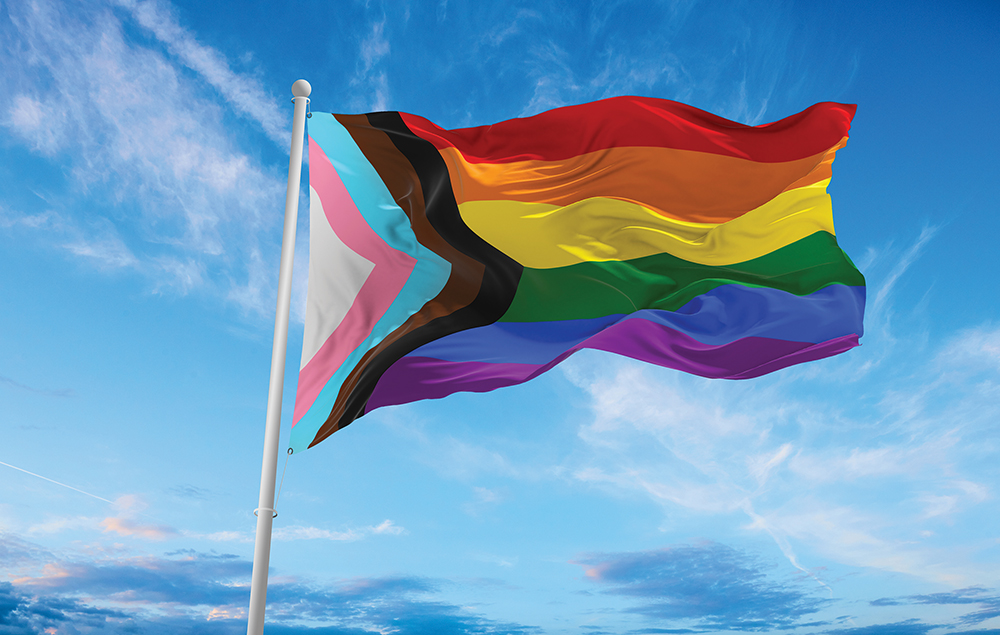Jesus Santa Cruz (he/they), a Los Angeles native and current high school English teacher in Memphis, thinks back to his English teacher of his freshman year in high school. “There was a section in my teacher’s library that said ‘LGBT Books,’” he says. “I will always remember that classroom library.”
Santa Cruz explains that at the time, he was intrigued yet afraid to pick those books up because, for one, they weren’t a common thing to see in a classroom, and two, he hadn’t yet felt comfortable enough to fully express that part of his identity. But now, as a proud queer individual in his 30s, he understands why that memory sticks with him. It was how that section of his English teacher’s classroom library made him feel. Every day, he stepped into that classroom knowing that someone understood him, that someone accepted him. He felt seen and accepted, simply because he was included.
Schools are where children spend most of their time developing and practicing their beliefs. In schools, children learn and internalize almost everything they hear and see. The classroom isn’t just a place for growing minds to learn how to be better writers, readers, and mathematicians, but a place for our nation’s youth and future leaders to socialize and explore in hopes of discovering their true identities and reaching their fullest potential. In order for children to feel safe in doing so, schools, classrooms, and teachers must create a safe environment, inclusive of everyone — but unfortunately, this is not always the case.
After reading that Tennessee lawmakers planned House Bill 0800, which “would ban textbooks and instructional materials that ‘promote, normalize, support, or address controversial social issues, such as lesbian, gay, bi-sexual, and transgender (LGBT) lifestyles,’” I was first reminded of where in the world I was. (I’m living in the South, so how can I be surprised?) Secondly, I came to a realization that this is much bigger than my current coordinates on the United States map but an issue that has repeated itself throughout U.S. history and across the map — the silencing of voices. Voices that have echoed throughout generations and centuries of suppression and dehumanization.
In other words, “Here we go again,” as Santa Cruz says. “In a non-pessimistic way, I’m upset but, living in this country for as long as I have, I’m not surprised.”
Another bill Tennessee lawmakers plan to include, House Bill 2633, states that “a teacher or other employee of a public school or LEA is not required to refer to a student using the student’s preferred pronoun if the pronoun does not align with the student’s biological sex.” To put it simply, a student’s pronouns will not matter. Teachers and other employees of public schools get to call students whatever pronouns they want, despite them communicating what they feel most comfortable with.
Santa Cruz expresses that living in Memphis as someone who is queer is like “living in a time capsule.” As for myself, I would describe my experience as living in a box. Constricting myself into walls that eventually cave in, suffocating my authentic self out of me and exhaling frustrations out onto this keyboard. That is the experience of a queer individual living in a society she is not sure is fully accepting of her.
When it comes down to the queer experience in Memphis, Tennessee, located deep in the infamous Bible Belt, I couldn’t have used a better metaphor than the “time capsule,” as Santa Cruz described. Many parts of the city remain untouched, including some outdated values and traditions — and Santa Cruz and I aren’t the only ones who feel this way.
Though most LGBTQ+ adults are aware of these issues, including other teachers and employees who work in our schools, our youth are not oblivious to them either. “It’s the 21st century. We should have been over homophobia by now,” explains a teenage student who attends public school in Memphis and identifies as queer. “Us children are discovering who we are earlier than generations before us. Banning textbooks and ignoring our pronouns won’t stop us from discovering who we really are.”
Another student politely joins the conversation, “When adults aren’t supportive of who we are, it makes people like us feel like it’s hard to be ourselves. It makes us feel like we don’t belong.”
The two students, who both identify as LGBTQ+ and gender-fluid, agree that if teachers normalized listening and allowed them material that is inclusive of their queer identities, it would help them build confidence in who they are and what they choose for themselves.
We still have yet to see our country’s leaders bury that time capsule so we can move forward. It is difficult to say that America is truly working toward positive change if our schools are not inclusive of all the diverse backgrounds and identities of our youth. America’s reputation for cloaking its regressions and immobilities in sparkling words, half-truths, or even complete silence remains.
Ashley Insong is a starving artist who is working toward being published in The New York Times while teaching full-time and freelance writing part-time. She enjoys singing and writing poetry and short stories about love, self-discovery, and her Filipina heritage.
